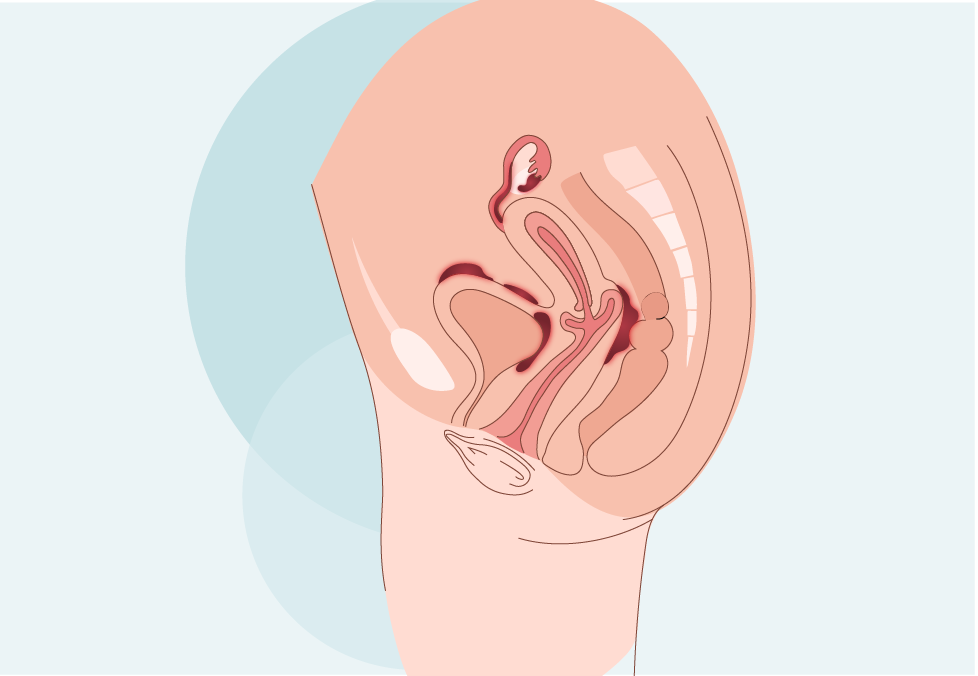The Body
Endometriosis lesions

The location, size, and depth of endometriosis tissue might influence whether endometriosis causes the areas to become sensitive and be associated with pain. Endometriosis that grows in the cul-de-sac, the area underneath the cervix, can be seen in people who feel deep vaginal pain. Inflammation is commonly observed in the areas of the body where endometriosis grows. Inflammation can make these areas become sensitive which can feel painful when touched during deep vaginal penetration.
In addition to inflammation, pain felt with sex can be influenced by a process called neurogenesis. Neurogenesis is the process of nerves growing in the body.
Your nerves send information about what is happening in the body to the brain. During deep vaginal penetration, the nerves around endometriosis tissue sense that the area is being contacted. The nerves send messages to the spinal cord. The spinal cord then transfers those messages to the brain. The brain processes these messages and this is how you feel pain. Through neurogenesis, there might be more nerves that grow around the endometriosis tissue1. With more nerves, there may be more messages sent to the brain during deep vaginal penetration.
Bladder, Bowel & Muscles
Other conditions of the bladder, bowel or muscles that are unrelated to endometriosis can also play a role in deep vaginal pain. One reason why a condition unrelated to endometriosis causes pain is through changes in the nervous system2.
The nervous system can change in ways which can make sex feel painful. This is an area of ongoing research. Click through the box below to read more about the different ways the nervous system can change.
The nervous system can also change if the nerves around endometriosis become “sensitized.” This means that the nerves are sending more messages to the brain, even if there is no change in the endometriosis tissue or in the number of nerves.
The nerves in the brain and spinal cord can also become “sensitized.” When this happens, the nerves in the brain and spinal cord increase the effect of the incoming messages from the body. Things such as stress, anxiety and depression may further intensify these messages in the brain.
Another way the nervous system changes is by cross sensitization. This occurs when nerves of different body parts share messages with each other. There may be a transfer of pain messages between the nerves of the reproductive organs (e.g. uterus and ovaries) and the nerves of other organs in the pelvis (e.g. bladder and pelvic floor muscles). This transfer of pain messages might make everything more sensitive. For example, research has shown that people with endometriosis that also have a sensitive bladder or sensitive pelvic floor muscles are more likely to have painful sex3.

- Williams C, Hoang L, Yosef A, Alotaibi F, Allaire C, Brotto L, Fraser IS, Bedaiwy MS, Ng TL, Lee AF, Yong PJ. (2016) Nerve bundle density and deep dyspareunia in endometriosis. Reproductive Sciences, 23(7):892-901.
doi:10.1177/1933719115623644 - Yong, P. J. (2017). Deep dyspareunia in endometriosis: A proposed framework based on pain mechanisms and genito-pelvic pain penetration disorder. Sexual Medicine Reviews, 5(4), 495. doi: 10.1016/j.sxmr.2017.06.005
- Orr N, Noga H, Smith K, Williams C, Allaire C, Bedaiwy M, Yong P. (2018). Bladder and Pelvic Floor Tenderness in Endometriosis Deep Dyspareunia. The Journal of Sexual Medicine 15 (6), S109-S110. doi:10.1016/j.jsxm.2018.03.042
